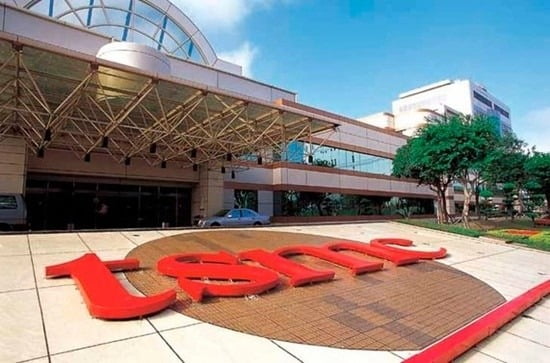
View of TSMC headquarters. TSMC homepage capture.
Taiwan TSMC, the world’s largest foundry (consignment production of semiconductors), recorded record-high performance in the fourth quarter of last year, and the stock price soared. It is interpreted that the stock market cheered when the performance exceeded expectations even though the customer with Huawei, one of TSMC’s major customers, was cut off.
TSMC announced on the 14th that it recorded sales of USD 36.15 billion (about 1,420 trillion won) in the fourth quarter of last year. This is a record-high quarterly sales record.
In the fourth quarter of last year, sales increased by 14% and 1.4%, respectively, compared to the same period of the previous year and the previous quarter. Net profit recorded Taiwanese dollars 147.72 billion, an increase of 23% from the same period last year. The net margin reached 54%, exceeding the market forecast.
In the securities industry, there is an evaluation of’earning surprise (surprising performance beyond the consensus)’. Initially, it was expected that TSMC would deliver sluggish 4Q results since it lost its main customer, Huawei. Due to US sanctions, TSMC completely ended business with Huawei on September 15 last year.
TSMC’s solid performance without Huawei is due to orders from Chinese manufacturers trying to fill the gap in Huawei.
It is known that smartphone makers such as Xiaomi, Oppo, Vivo and other companies have competitively placed orders for semiconductor components such as application processors (AP) to TSMC in order to increase smartphone shipments. In addition, most orders for smartphone semiconductors such as Apple, Qualcomm, and MediaTek are still being produced by TSMC.
The percentage of sales of’fine process’, which is in fierce competition with Samsung Electronics, has also increased significantly. TSMC’s sales of 5nm (nanometer) process products out of total sales during this period were 20%, up 12 percentage points from the previous quarter.
Last year as a whole, the proportion of 5-nano sales reached 8%. TSMC is planning to test-produce 3-nano products, the next-generation ultra-fine process this year, and start mass production in the second half of next year.
TSMC’s share price surged on the announcement of earnings that exceeded market expectations. TSMC’s ADR (U.S. Stock Depository), listed on the New York Stock Exchange, ended the transaction with an increase of 6.06% on the 14th (local time). TSMC’s share price soared close to 13% during the week. Last year, TSMC’s ADR rose 92%. Samsung Electronics also posted a solid performance despite the novel coronavirus infection (Corona 19) last year, and the stock price rose 82%.
In the industry, there is a prospect that TSMC will expand investment. According to the Wall Street Journal (WSJ), TSMC announced at a conference call (conference call) immediately after its 4th quarter earnings announcement that “it set capital expenditures this year at a minimum of $25 billion (about 27.48 trillion won) and a maximum of $28 billion.” TSMC plans to focus 80% of its investment on improving the 3-nano process. It plans to test-produce 3-nano products this year and mass-produce in the second half of next year.
Reporter No Jeong-dong Hankyung.com [email protected]
Ⓒ Hankyung.com prohibits unauthorized reproduction and redistribution
